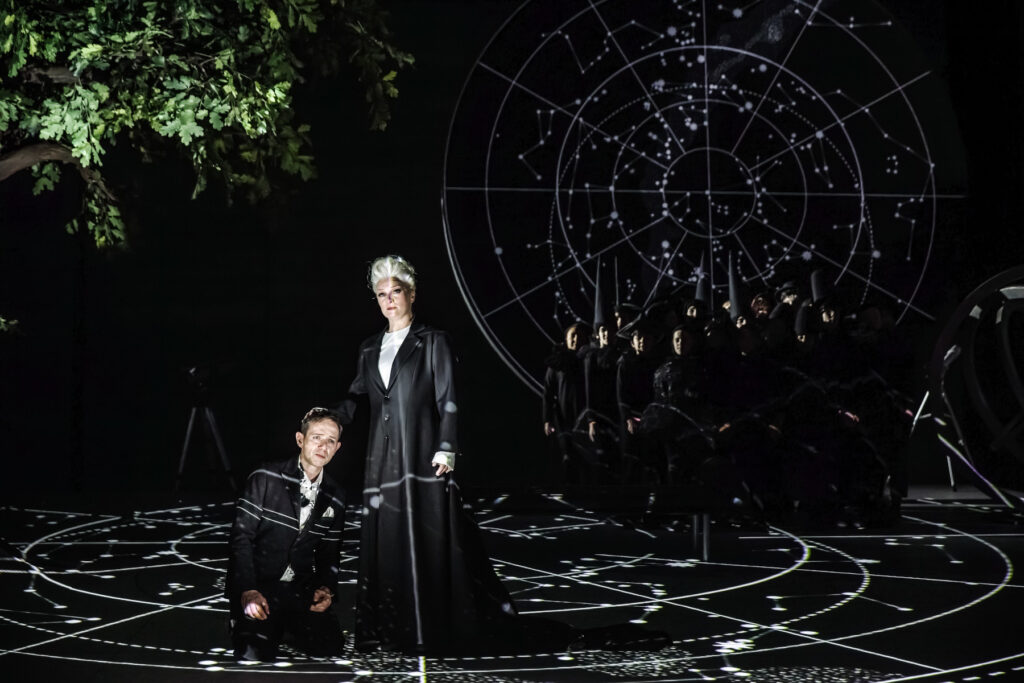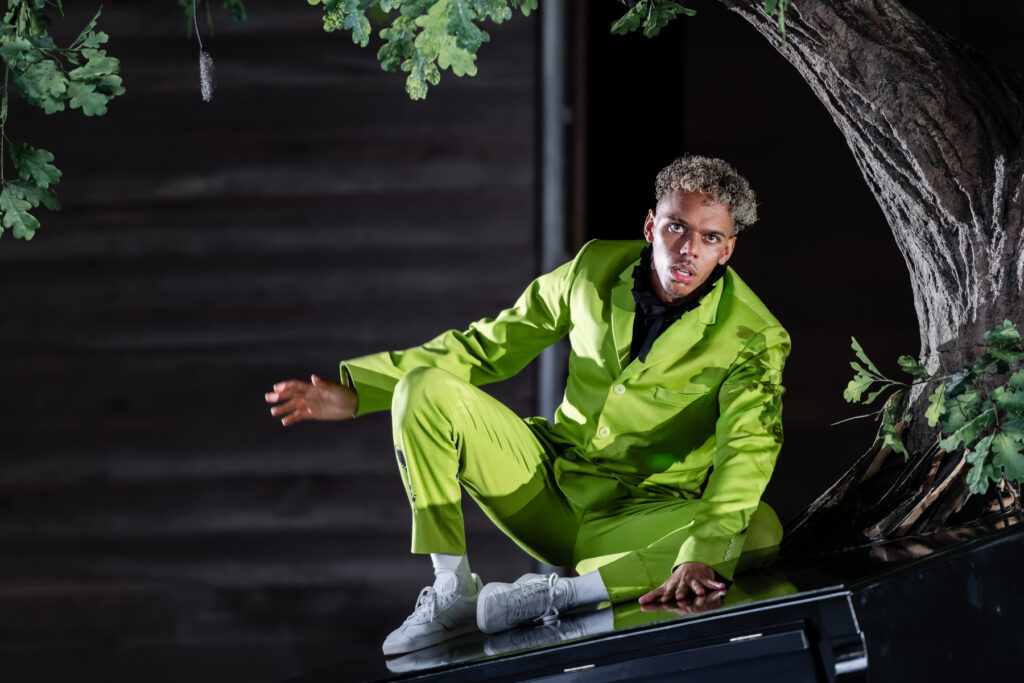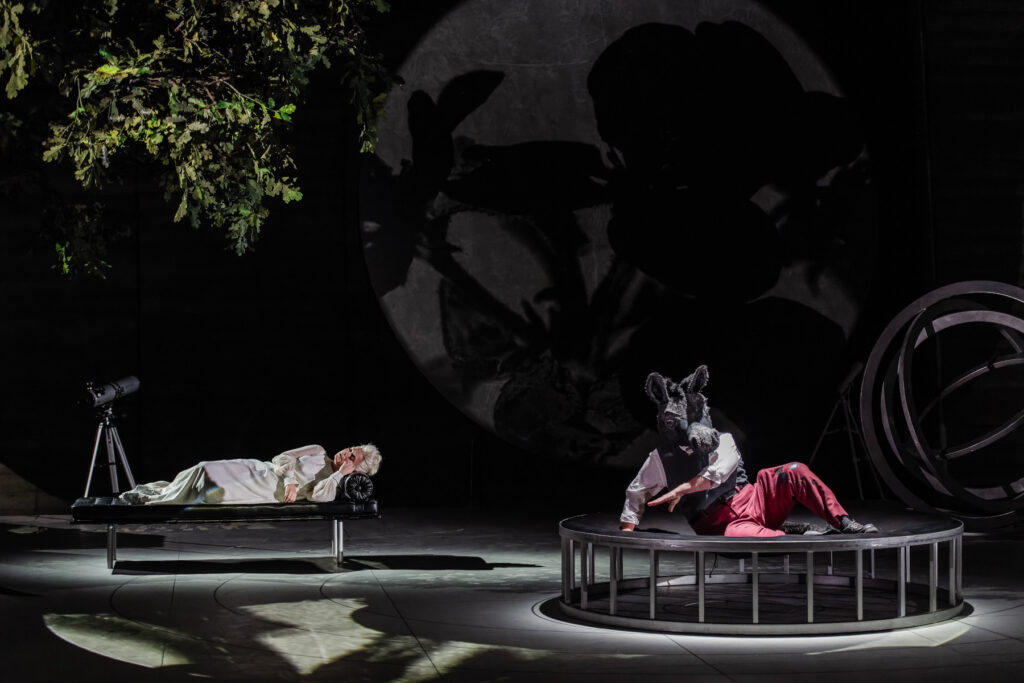Netia Jones’s new staging of Britten and Pears’s take on Shakespeare’s play creates plenty of mystery, though not necessarily the kind that’s easy to appreciate. Her single monochrome set intrigues the eye for its astrological fixtures and fittings (telescopes, an astrolabe and a giant screen resembling the moon), each positioned to the rear of a luxurious oak tree into which a grand piano is embedded. This surreal idea intends to evoke a collision of real and imaginary worlds. And if that is already obscure, a low couch further transforms Theseus’s court and the fairy Kingdom to suggest an expansive consultation room for scientific or psychiatric analysis. Thanks to Garsington’s idyllic setting hints of the Athenian Forest can be glimpsed through the theatre’s glass panels until black drapes darken the mood from Act 2. The Bard’s fairies (taken up by the excellent Garsington Opera Youth Company) pop up at various times through trapdoors, their all-black attire and animal headgear making them look more like J. K. Rowling’s trainee wizards than glittering sprites.

The drunken arrival of a white-suited Theseus at the very beginning expands Jones’ head-scratching concepts. Oberon periodically wears a wolf’s head, and a trampoline is a playful and possibly symbolic prop for the rude mechanicals. With so much to unravel, there are times when one just wants to listen to the music with one’s eyes shut. Thankfully, this production enjoys the talents of a terrific cast led by countertenor Iestyn Davies (Oberon) and soprano Lucy Crowe (Tytania). Davies is, as ever, in lustrous voice, vocally enchanting and heard to impressive effect in the sinuous phrases of ‘I know a bank’. No less focused is Crowe whose ‘Come Now a Roundel’ is exquisite, sung with a Handelian purity and no sense of effort when at the top of her range. Just a pity the chemistry between her and Davies isn’t more convincing, both seemingly detached in their otherworldly exchanges.
Elsewhere, the quartet of young lovers, attired as a group of Enid Blyton’s school children, make strong, if under-directed, musical impressions, their various entanglements bringing a certain longueur to Act 2. Caspar Singh’s vocally virile Lysander and Stephanie Wake-Edwards’ exasperated and fruity-voiced Hermia contrast well with James Geidt’s clarion-voiced Demetrius and Camilla Harris’s besotted ‘spaniel’ Helena – her singing especially rewarding for being unforced. Cameo roles succeed well from Nicholas Crawley’s pugnacious Theseus and Christine Byrne’s expressive Hippolyta.

But the evening’s enchantment comes from a superb group of rustics whose singing and acting does much to address limitations in other roles. That said, one waits until Act 3 before there’s any sign of vigorous audience response from the group’s Victorian music hall routine in their Pyramus and Thisbe sequence. Each of the mechanicals is nicely differentiated in their absurd outfits: John Savournin’s fussy Quince, Frazer Scott’s wholesome Snug, Geoffrey Dolton’s camp Starveling, James Way’s gender-bending Flute (‘These lily lips’ a special joy when sung in a red ball grown) and Adam Sullivan’s dull-witted Snout. Best of all is Richard Burkhard’s Bottom, casting aside buffoonery for his customary panache and adding vocal warmth to ‘When my cue comes’.
The Wormsley youngsters are on good form, singing with neat articulation for their ‘spotted snakes’ episode and suitably soothing in their Act 2 lullaby – rhythm and tuning impeccable. Britten wrote these parts for boys’ voices, but I cannot imagine he would have been disappointed in this well-drilled ensemble mostly comprising girls. He might have had reservations about Jerone Marsh-Reid’s Puck: athletic though he may be, there is little to beguile in his lukewarm antics, and not quite the boy-acrobat envisaged by the composer.

If there’s any magic potion anywhere in this production, it’s in the brilliance of Britten’s imaginatively conceived score, its gossamer-like textures unveiled here by Douglas Boyd and the Philharmonia Orchestra with marvellous control, those opening string glissandi plunging the listener directly into Shakespeare’s dream world. If you’re unable to go to Garsington before the production ends on July 19, there’s another opportunity to hear these excellent players and singers at the Royal Albert Hall in September [Prom 68]. This production may not be magical, but there’s much to captivate the ear and mind.
David Truslove
A Midsummer Night’s Dream
Music: Benjamin Britten
Libretto: William Shakespeare, adapted by Benjamin Britten and Peter Pears
Cast and production staff:
Oberon – Iestyn Davies; Tytania – Lucy Crowe; Puck – Jerone Marsh-Reid; Theseus – Nicholas Crawley; Hippolyta – Christine Byrne (replacing Christine Rice); Lysander – Caspar Singh; Demetrius – James Geidt (replacing James Newby); Hermia – Stephanie Wake-Edwards; Helena – Camilla Harris; Bottom – Richard Burkhard; Quince – John Savournin; Flute – James Way; Snug – Frazer Scott; Snout – Adam Sullivan; Starveling – Geoffrey Dolton
Director & Designer – Netia Jones; Choreographer – Rebecca Meltzer; Lighting – D M Wood; Fight Director – Christian Sordelet; Garsington Opera Youth Company; Philharmonia Orchestra; Musical Director – Douglas Boyd
Garsington Opera, Wormsley Estate, Buckinghamshire, 21 June 2024
Top Image: James Way as Flute, Geoffrey Dolton as Starveling, Adam Sullivan as Snout, Richard Burkhard as Bottom and Frazer Scott as Snug. Photo by Craig Fuller.